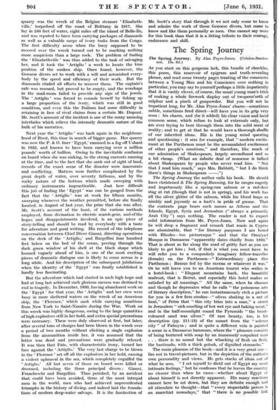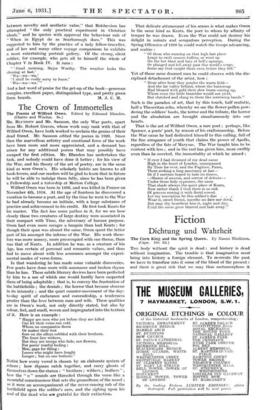The Spring Journey
As you start on this gorgeous lark, this bundle of chuckles, this poem, this reservoir of epigram and truth-revealing phrase, and read some twenty pages treating of the commerce between a Young Man and his Conscience over nothing in particular, you may say to yourself perhaps a little impatiently that it is vastly clever, of, course, .the usual young man's trick of making a whole firework display out of twopenn'orth of sulphur and a pinch of gunpowder. But you will not be impatient long, for Mr. Alan Pryce-Jones' charm—sometimes subtle, sometimes fired direct—will have you in its grip very soon : his charm, and (be it added) his clear vision and lucid common, sense, which refuse to look at externals only, but are ever trying to bore through them into the solid meat of reality; and to get at that he would have a thorough shuffle of our inherited ideas. His is the young mind questing and questioning : it sees for example, that " modem excite- ment at the Parthenon must be the accumulated excitement of other people's emotions," and therefore, like much of our admiration of Shakespeare, largely secondhand and so a bit cheap. (What .an infinite deal of nonsense is talked about Shakespeare by people who never read him. " Not that I read him much," says Mrs. Babbitt, " but I do think there's things in Shakespeare —.") The Spring Journey the author calls his book. He should have christened it The Spring Running, for he ranges eagerly and impetuously like a spring-run salmon or a red-deer stag at rut (though that is not in spring), and his work has all the silver glitter of the salmon, while his blood leaps as nimbly and joyously as a hart's in pride of grease. That the contents page bears such names as Athens and the Islands, Egypt, Syria and Jerusalem (" always a primarily Arab City ") says nothing. The reader is not to expect solid information from Mr. Pryce-Jones. Now and again he will drop a fragment and remark that roads in Cyprtr, are abominable, that " for literary purposes I am bored with Rhodes—too picturesque " and that the Omaiyad Mosque in Damascus "apparently dates chiefly from 1893." That is about as far along the road of gritty fact as you are likely to get him ; but, if that is what you must have, he will refer you to a compositely imaginary fellow-traveller (female) on the Parthenon—" Extraordinary place this Parthenon ; Remus fed by the ravens or whatever it was." Or he will leave you to an American tourist who writes in a hotel-book : " Elegant mountains back, the beautiful seafront, that is Beirut, and especially this hotel makes us satisfied by all meanings." All the same, when he chooses and though he deprecates what he- calls " the poisonous arts of literary description," he can instantaneously etch a picture for you in a few firm strokes—" olives shaking in a net of heat," of Petra that " this city bites into a man," a street in Jerusalem " sick-smelling of hot wet rye and baking meat," and in the half-moonlight round the Pyramids " the beast- coloured sand was silver." Of rare beauty, too, is his description (pp. 211-13) of the sunset from the " solemn city " of Palmyra ; and in quite a different vein is painted a scene in a Damascus hammam, where the " pleasure consists of being buttered with soap by an inunenself corpulent man . . . there is no sound but the whacking of flesh on the bastinado, with a thick golosh, of dignified stomachs."
The main pleasure of the book—and it is a very great one - lies not in travel-pictures, but in the depiction of the author's own personality and views. He gets stacks of ideas out of what he sees. " I set myself to distil out of Egypt my most intimate feelings," but he confesses that he leaves the country no clearer than when he came—whether about Egypt or about himself is not directly apparent. His many reactions cannot here be set down, but they are definite enough and all stimulate to thought—that " every respectable person is an anarchist nowadays," that " there is no possible link
between novelty and aesthetic value," that Bolshevism has attempted " the only practical experiment in Christian ideals," and he quotes with approval the behaviour rule of " When in Egypt do as Scarborough does." This was suggested to him by the practice of a lady fellow-traveller, and of her and many other voyage companions he exhibits a most entertaining portrait gallery. Of the strong, silent soldier, for example, who gets all to himself the whole of Chapter V in Book IV. It runs : " Good morning, Major Worthy. The weather looks like
clearing at last.' W&—V7a—WEL.'
I shall be really sorry to leave.'
Wa—wa--wa.'
And a last word of praise for the get-up of the book—generous margins, excellent paper, distinguished type, and pretty green







































 Previous page
Previous page